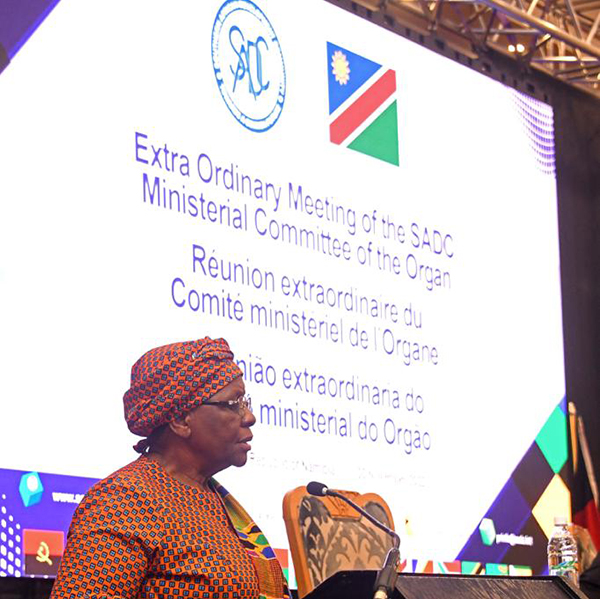Albertina Nakale
While recent flare-ups in violence in the Democratic Republic of Congo left hundreds dead and thousands displaced, the conflict continues to threaten the Southern African Development Community’s common aspirations for regional integration and economic development.
The eastern DRC is engulfed in violence because of armed groups competing over the area’s rich mineral resources.
This week’s SADC meeting of the extraordinary ministerial committee of the Organ on Politics, Defence, and Security Cooperation met in Windhoek with a focus on the crucial question of how to solve the political, security and social problems that have plagued the eastern DRC for decades.
Namibia’s international relations minister Netumbo Nandi-Ndaitwah noted the challenges the regional troops (from Malawi, South Africa and Tanzania) are facing, which requires the region to re-double its efforts to ensure stability in the DRC.
She expressed SADC’s solidarity with the DRC and will continue to remain seized with ensuring peace and stability in the eastern part of the country.
As the chairperson of the ministerial committee of the organ, Nandi-Ndaitwah was mandated by the 42nd Summit of Heads of State and Government, assisted SADC ministers and the Secretariat, to facilitate an engagement with the government of the DRC with regard to the UN Stabilisation Mission in the DRC (MONUSCO).
She said the meeting provided an opportunity to collectively and objectively assess the status of implementation of the Summit decisions, as well as to map out a way forward in our concerted efforts to bolster peace, security and stability, towards the development of the SADC region.
In an attempt to bring stability to the volatile regions of the DRC, MONUSCO was mandated by the Security Council to support the authorities in protecting civilians.
It stands alongside the population and supports the national defence and security forces in their fight against armed groups. Neighbouring countries’ troops have crossed into DRC, chasing rebel groups that they accuse of trying to destabilise their countries.
MONUSCO was established by the United Nations Security Council in resolutions 1279 (1999) and 1291 (2000) to monitor the peace process of the second Congo war.
SADC is still waiting for the United Nations to provide written feedback on the regional bloc’s submission pertaining to the war-torn Democratic Republic of Congo.
She said, “recent attacks in the eastern part of the DRC have left hundreds dead and thousands displaced. These security threats by rebel forces continue to be of great concern to our region. These security challenges threaten our common aspirations for regional integration and further threaten to close the economic space for development and incentives for industries to grow and create sustainable jobs, in particular for women and youth,” she remarked yesterday during the extraordinary meeting.
In the spirit of collective security, she said the SADC force intervention brigade, under the command of MONUSCO, has been neutralising negative forces in the eastern part of the DRC, and the organ commended them for their steadfastness.
Nandi-Ndaitwah indicated SADC invited the UN to enhance its support to the bloc and relevant stakeholders to cooperate with SADC towards this end.
“We applaud recent initiatives aimed at ending hostilities in the eastern DRC. During September 2022, on the margins of the United Nations General Assembly, a SADC delegation, led by Stanley Kakubo, minister of foreign affairs and international cooperation of the Republic of Zambia and incoming chairperson of the ministerial committee of the Organ engaged the United Nations on configuration, structure and mandate of the Force Intervention Brigade,” she mentioned.
As ministers reflect on the SADC’s defence and security agenda, she emphasised the need to recognise the importance of ensuring security in the land, air and maritime domains.
She pledged the region continue the fight against the political and security threats, as well as social and economic threats faced by some member states.
To mitigate these threats, SADC has put in place measures, including the development and revision of national counter-terrorism strategies and plans of action, constitutional reforms, crafting and implementation of socio-economic transformation policies, and strengthening of legislation and national strategies dealing with transnational organised crime, amongst others.
Furthermore, she highlighted that regional engagement and mediation efforts in the Kingdom Eswatini are progressive and constructive, bearing in mind that President Hage Geingob, chairperson of the SADC Organ on Politics, Defence and Security Cooperation, concluded a one-day working visit on 18 November 2022 to the Kingdom of Eswatini.
President Geingob paid a courtesy visit to King Mswati III, which provided an opportunity for the chair of the Organ to introduce himself in that capacity, having been entrusted with the mandate to deal with the issues of peace and security in the region.
The meeting is also expected to provide an update on the security issue in the Cabo Delgado Province of Mozambique, where the region has deployed a Military Mission to neutralise the terrorist activities that have plagued that part of the Republic of Mozambique
– anakale@nepc.com.na


